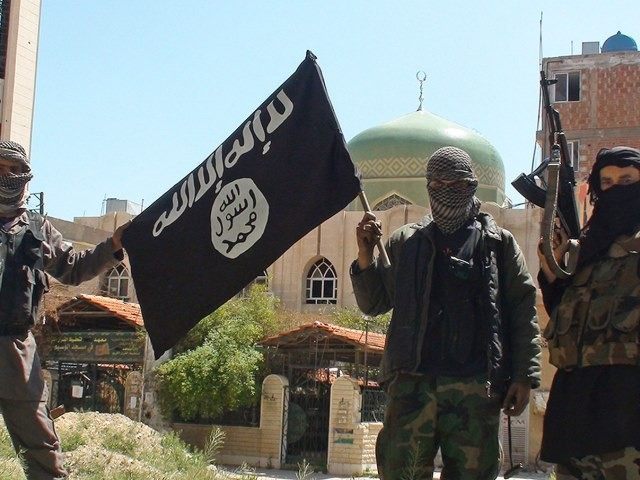The Islamic State (ISIS/ISIL) is reportedly seeking to recruit individuals with sophisticated skills as it expands its foothold in Pakistan.
ISIS’s branch in the Afghanistan-Pakistan region is known as the Khorasan Province (ISIL-K).
As he tried to lure him into joining ISIL-K, a would-be recruiter told Pakistani journalist Hasan Abdullah, “Brother, you could be such an asset to the Ummah” — the Islamic community, reports the Associated Press (AP). “Abdullah replied that he was enjoying life and had no plans to join the militants,” notes AP.
ISIL-K is turning to the educated class for new recruits.
“[ISIS] recruiters have been stalking university campuses,” notes AP, later adding that the terrorist group’s branch in Pakistan is recruiting from a pool of university students, doctors, lawyers, journalists, and businessmen, and using women for its fundraising operations.
Huma Baqai, a professor at the Institute of Business Administration in Karachi, told AP that there are radicalized professors teaching in some of Pakistan’s top universities.
They “are using the classrooms to mold (students’) minds,” Baqai said. “There is no scrutiny in what happens in the classroom.”
Several university professors suspected of being ISIS loyalists and trying to recruit students have been interrogated, a Pakistani intelligence official told AP on condition of anonymity.
“Finding people who are willing to strap on a suicide vest and blow themselves up is easy. There are hundreds, thousands,” said Abdullah, the journalist.
“He said he knows two other journalists whom [ISIS] tried to enlist,” reports AP. “Abdullah said [ISIS] probably sought him because he was known from his work writing on extremism in the region and has met many militants personally.”
AP learned from Abdullah that ISIL-K wants to recruit him because, as a journalist, he could be an asset to the group’s propaganda efforts.
“His encounter was a sign of how the [ISIS] is looking for sophisticated skills as it builds its foothold in new territory: Pakistan,” reports AP.
ISIS announced its presence in the Afghan-Pakistan region in January 2015, less than a month after President Obama declared an end to the U.S. combat mission in Afghanistan.
The Khorasan Province has established a stronghold in eastern Afghanistan’s Nangarhar province, which borders Pakistan, according to the Pentagon.
A United Nations report released in September 2015 revealed that ISIL-K is growing and actively recruiting in nearly 75 percent (25) of Afghanistan’s 34 provinces. Gen. John Campbell, the top commander of American and NATO forces in Afghanistan, has estimated that there are up to 3,000 ISIS-linked jihadists in Afghanistan.
Raja Umer Khattab, head of the Sindh province Counter-Terrorism Department, has reportedly warned that the Khorasan Province has great potential to expand in Pakistan.
The presence of ISIL-K was first felt in Pakistan when the group attacked a bus carrying members of the Ismaili community Karachi’s Safoora Goth in May 2015, killing 45 people.
“The number of [ISIS] loyalists in Pakistan is not known,” notes AP. “Government officials only recently admitted that they have a presence and insist loyalists here have no known operational links to [ISIS] leadership in Iraq and Syria.”
Pakistan’s Director General of the Intelligence Bureau Aftab Sultan told a Senate panel earlier this month that hundreds of Pakistanis have traveled to Syria to engage in jihad, adding that some are now returning home to Pakistan to recruit.
AP learned from Khattab that “one way [ISIS] militants are trying to recruit and build is through women.”
Khattab told AP that Pakistani authorities apprehended several women, including the wife of a suspected ISIS jihadists. They were reportedly released after questioning.
AP points out that professionals can hold leadership posts or be involved in the terrorist group’s propaganda efforts.
“Al Qaeda in particular is pursuing a similar caliber of recruits,” adds the news outlet.
“Khattab said it isn’t clear who is winning the competition but there are known instances of Al Qaeda militants in Pakistan crossing over to [ISIS],” also notes AP.
Analyst Bruce Hoffman, director of the Center for Security Studies at Georgetown University in Washington, explained that the stereotype of a militant as a tribesman from the mountains in traditional garb with bandoliers of ammo slung over his shoulder no longer applies.
The new generation of recruits comes from “well-educated, cosmopolitan, university-educated Pakistanis from middle-class backgrounds who can navigate our globalized space whether virtually or physically with facility and confidence,” he told AP.
“They are the new force multipliers of terrorist groups,” also said Hoffman.
Khorasan is an ancient name for a region that includes Afghanistan, Pakistan, as well as parts of Iran, India, and other surrounding countries.

COMMENTS
Please let us know if you're having issues with commenting.